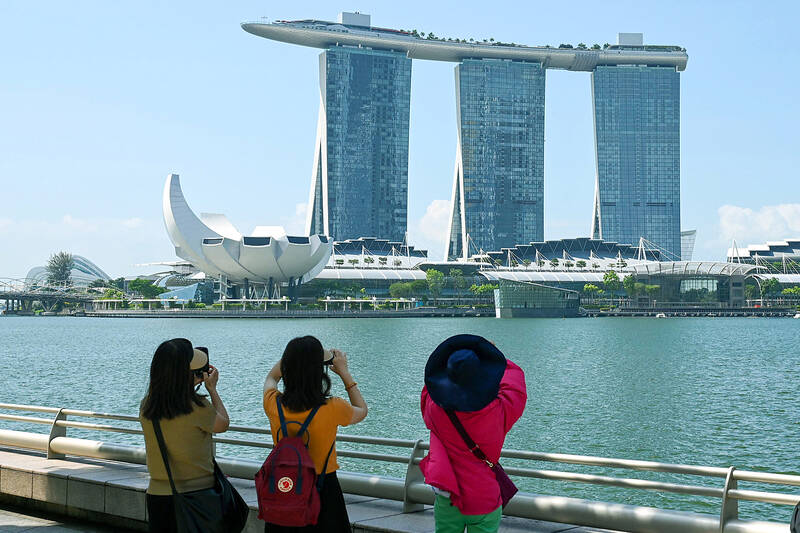The Singaporean economy posted better-than-expected results in the first quarter of this year, official data showed yesterday, but the government warned that the global outlook remains gloomy.
The Southeast Asian city-state’s economic performance is often seen as a barometer of the global environment because of its reliance on international trade.
Its economy expanded 0.4 percent year-on-year in first three months, slower than the 2.1 percent year-on-year growth in the previous quarter, but better than an advance estimate released last month, figures released by the Singaporean Ministry of Trade and Industry showed.

Photo: AFP
Quarter-on-quarter, the economy shrank 0.4 percent, but that was also better than expected.
The ministry maintained its growth forecast for this year of 0.5 to 2.5 percent, saying that the figure was likely to be in the middle of that range.
However, “downside risks in the global economy have risen,” it added.

Photo: AP
In its statement, it cited a “sharper-than-expected tightening in global financial conditions,” and “escalations in the war in Ukraine and geopolitical tensions among major global powers.”
There was a weak reading from the manufacturing sector, which shrank 5.6 percent year-on-year in the first quarter, worsening from the 2.6 percent shrinkage in the fourth quarter last year.
“Singapore’s external demand outlook for the rest of the year has weakened,” the ministry said.
“Apart from the expected slowdown in the advanced economies, the electronics downcycle is likely to be deeper and more prolonged than earlier projected,” it added.
Meanwhile, Germany fell into a recession around the turn of the year, official figures published yesterday showed, as inflation and higher interest rates curbed demand in Europe’s largest economy.
Over the first three months, the economy shrank 0.3 percent, the federal statistics agency Destatis said, downgrading an initial estimate of zero percent.
Following a 0.5 percent contraction in the final three months of last year, it was Germany’s second consecutive quarter of negative growth — the threshold for a “technical recession.”
The slump came as Germany battled a surge in energy prices in the wake of the Russian invasion of Ukraine, which has weighed on households and businesses.
The increased cost of energy has driven inflation, which sat at 7.2 percent in Germany last month, down only slightly from its peak toward the end of last year.
“The persistence of high price increases continued to be a burden on the German economy at the start of the year,” Destatis said in a statement.

When an apartment comes up for rent in Germany’s big cities, hundreds of prospective tenants often queue down the street to view it, but the acute shortage of affordable housing is getting scant attention ahead of today’s snap general election. “Housing is one of the main problems for people, but nobody talks about it, nobody takes it seriously,” said Andreas Ibel, president of Build Europe, an association representing housing developers. Migration and the sluggish economy top the list of voters’ concerns, but analysts say housing policy fails to break through as returns on investment take time to register, making the

‘SILVER LINING’: Although the news caused TSMC to fall on the local market, an analyst said that as tariffs are not set to go into effect until April, there is still time for negotiations US President Donald Trump on Tuesday said that he would likely impose tariffs on semiconductor, automobile and pharmaceutical imports of about 25 percent, with an announcement coming as soon as April 2 in a move that would represent a dramatic widening of the US leader’s trade war. “I probably will tell you that on April 2, but it’ll be in the neighborhood of 25 percent,” Trump told reporters at his Mar-a-Lago club when asked about his plan for auto tariffs. Asked about similar levies on pharmaceutical drugs and semiconductors, the president said that “it’ll be 25 percent and higher, and it’ll

NOT TO WORRY: Some people are concerned funds might continue moving out of the country, but the central bank said financial account outflows are not unusual in Taiwan Taiwan’s outbound investments hit a new high last year due to investments made by contract chipmaker Taiwan Semiconductor Manufacturing Co (TSMC, 台積電) and other major manufacturers to boost global expansion, the central bank said on Thursday. The net increase in outbound investments last year reached a record US$21.05 billion, while the net increase in outbound investments by Taiwanese residents reached a record US$31.98 billion, central bank data showed. Chen Fei-wen (陳斐紋), deputy director of the central bank’s Department of Economic Research, said the increase was largely due to TSMC’s efforts to expand production in the US and Japan. Investments by Vanguard International

WARNING SHOT: The US president has threatened to impose 25 percent tariffs on all imported vehicles, and similar or higher duties on pharmaceuticals and semiconductors US President Donald Trump on Wednesday suggested that a trade deal with China was “possible” — a key target in the US leader’s tariffs policy. The US in 2020 had already agreed to “a great trade deal with China” and a new deal was “possible,” Trump said. Trump said he expected Chinese President Xi Jinping (習近平) to visit the US, without giving a timeline for his trip. Trump also said that he was talking to China about TikTok, as the US seeks to broker a sale of the popular app owned by Chinese firm ByteDance Ltd (字節跳動). Trump last week said that he had